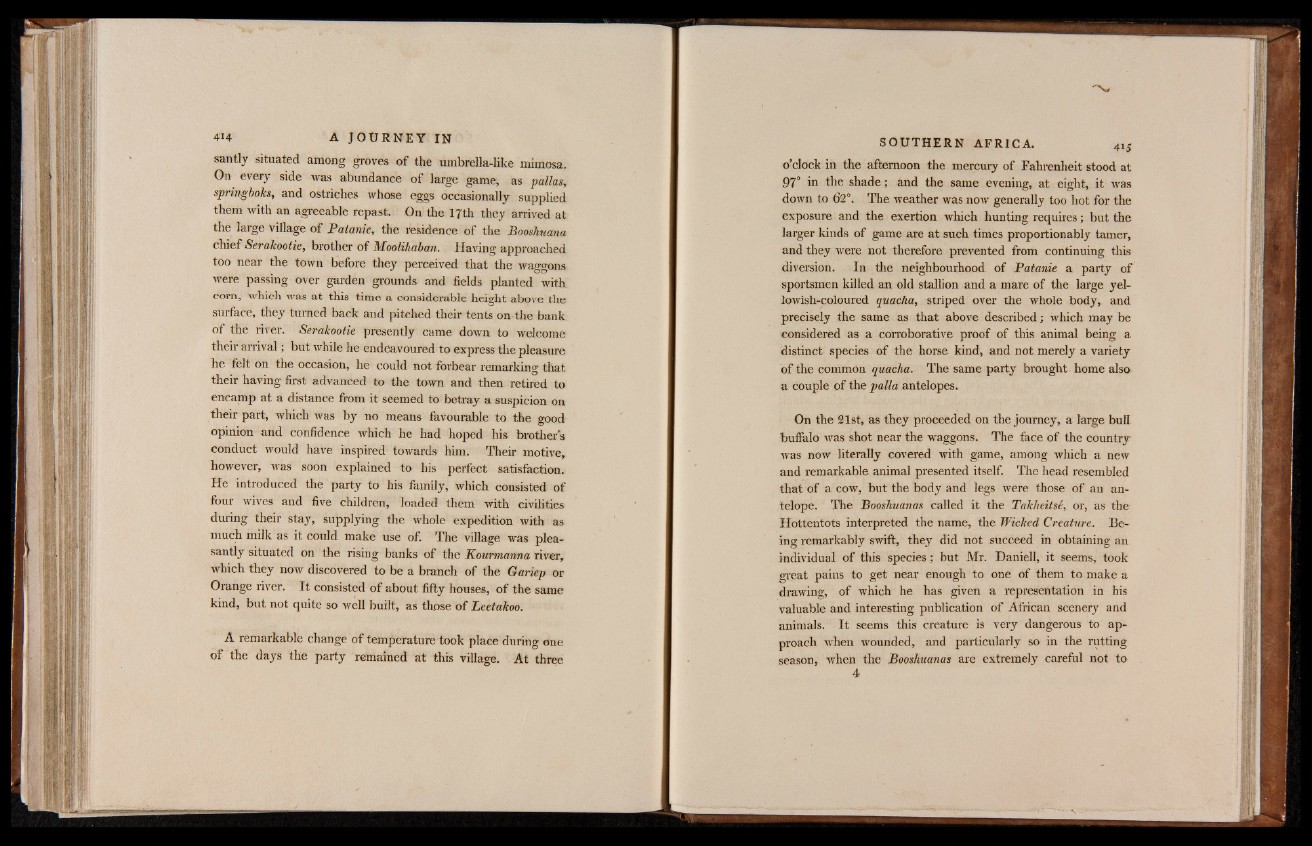
santly situated among groves of the umbrella-like mimosa.
On every side was abundance of large game, as pallas,
springboks, and ostriches whose eggs occasionally supplied
them with an agreeable repast. On the 17th they arrived at
the large village of Patanie, the residence of the Boosliuana
chief Serakootie, brother of Moolihaban. Having approached
too near the town before they perceived that the waggons
were passing over garden grounds and fields planted with
corn, which was at this time a considerable height above the
surface, they turned back and pitched their tents on-the bank
of the river. Serakootie presently came down to welcome
their arrival; but while he endeavoured to express the pleasure
he felt on the occasion, he could not forbear remarking that
their having first advanced to the town and then retired to
encamp a t a distance from it seemed to betray a suspicion on
their part, which was by no means favourable to the good
opinion and confidence which he had hoped his brother’s
conduct would have inspired towards him. Their motive,
however, was soon explained to his perfect satisfaction.
He introduced the party to his family, which consisted of
four wives and five children, loaded them with civilities
during their stay, supplying the whole expedition with as
much milk as it could make use of. The village was pleasantly
situated on the rising banks of the Kourmanna river,
which they now discovered to be a branch of the Gariep or
Orange river. I t consisted of about fifty houses, of the same
kind, but not quite so well built, as those of Leetakoo.
A remarkable change of temperature took place during one
of the days the party remained at this village. At three
o’clock in the afternoon the mercury of Fahrenheit stood at
97° in the shade; and the same evening, at eight, it was
down to 62°. The weather was now generally too hot for the
exposure and the exertion which hunting requires; but the
larger kinds of game are at such times proportionably tamer,
and they were not therefore prevented from continuing this
diversion. In the neighbourhood of Patanie a party of
sportsmen killed an old stallion and a mare of the large yellowish
coloured quacha, striped over the whole body, and
precisely the same as that above described; which may be
considered as a corroborative proof of this animal being a
distinct species of the horse kind, and not merely a variety
of the common quacha. The same party brought home alsa
a couple of the palla antelopes.
On the 21st, as they proceeded on the journey, a large bull
buffalo was shot near the waggons. The face of the country
was now literally covered with game, among which a new
and remarkable animal presented itself. The head resembled
that of a cow, but the body and legs were those of an antelope.
The Booshtianas called it the TakheitsS, or, as the
Hottentots interpreted the name, the Wicked Creature. Being
remarkably swift, they did not succeed in obtaining an
individual of this species ; but Mr. Daniel], it seems, took
great pains to get near enough to one of them to make a
drawing, of which he has given a representation in his
valuable and interesting publication of African scenery and
animals. I t seems this creature is very dangerous to approach
when wounded, and particularly so in the rutting
season, when the Booshuanas are extremely careful not to
4